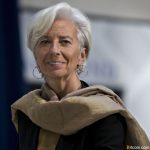Believe it or not Ghanaians have started getting interested in cryptocurrency. I took a chance to dig a little bit into the cryptocurrency development that is rumbling all over the place and found it interesting. From my very typical background of financial planning, investment management and risk management, I found this a bit too quirky. From its inception from 2009 riding on the blockchain technology, it has made huge inroads into the mainstream currency and investment landscape. The value has soared from nothing per bitcoin to $5,530 as at 25 October 2017. Therefore if one has 10 bitcoins the value is $55,300.
The creator Satoshi Nakamoto created Bitcoin after the world financial crises when the world thought we can no longer trust regulators to solely look after our finances. The thinking is simple, let the public and in fact anyone who wills take part of monitoring financial transactions. A 600-year old double ledger phenomenon residing only with financial intermediaries is broken. The blockchain technology places the entire ledger on a network and allow individuals to pick it up on the system and execute the transactions. These are called miners. In this case no one needs a bank to transfer money from person A to Person B in any part of the world. The cost to miners for this transfer is also much less than a traditional money transfer agent. There are a few more technicalities going deeper into mining of the currency but I would leave that for now.
Central banks around the world are at their wits end as to how to handle this ‘cryptofire’ (self-coined). Locally,we saw the swift sweep of how mobile money took over the financial space. Banks didn’t give it much attention until it caught them pants down. Now any bank without mobile money and without the intention of ever getting on board on some kind of digital finance is clearly lost and would be out of business not long from now. I see similarities between how mobile money took over Ghana and Africa’s banking space and how cryptocurrency would eventually take over global banking. A bit of an extreme case is where a man sells everything he has to buy Bitcoins as he pre-empts the ‘ultimate crytoboom’, (www.independent.co.uk, 11th October 2017 edition)

I must admit, it looks eerie how this whole thing works. How that this is unregulated with no ‘human’ face of a brand to hold responsible if something goes wrong. How that a wrong transaction can NEVER be reversed. How that the cryptocurrency related investments give skyrocketing returns to its investors (as high 300% p.a.) Clearly it is a bubble that may burst at some point. However looking at the developments in the digital space across all industries, this cryptocurrency phenomenon has come to stay. At this stage what should Bank of Ghana and the Securities and Exchange Commission be doing? Upon a little interest in cryptocurrency, it has emerged that Ghanaians are well into it. We would expect to hear something from regulators soon. However it should not be the one that says ‘cryptocurrency is banned’. It is just not possible by the nature of the currency. Russia, China, South Korea, Japan and a number of other countries have made one move or the other in recent times to either prevent or promote this movement. Japan recently endorsed 11 cryptocurrencies and seem to take steps to streamline its activities. India is considering issuing its own bitcoin-like currencies as a legal tender. Goldman Sachs is considering trading in bitcoins. Russia has had a bit of back and forth and now working with a 1st July 2018 deadline to establish how they would be regulate cryptocurrencies.  IMF President Christine Lagarde recently urged central banks, intimating that bitcoin is rising, and it may not be wise to discount cryptocurrencies as they are gaining more adoption and traction. That ‘digital currencies can give traditional currencies a run for their money’. Bill Gates has said ‘nobody can stop bitcoin’. However, there are some negative sentiments too. JP Morgan CEO Jamie Dimon says ‘bitcoin is a ‘fraud’ that will eventually blow up’. China banned their cryptocurrency exchanges in early October. The Financial Conduct Authority (FCA) in the UK have warned people in the UK to be wary of this development. South Korea has done a partial acceptance allowing foreign operators to work but still researching whether to adopt it is a currency. How would all these play in Ghana? A number of trends seem to support its success. These are the indelible proofs; the wide acceptance of mobile money, how the ‘internet of things’ has changed and is changing industries, individuals’ desire for convenience in financial services, , the desire for personal involvement in services, the surge of smart phones and the lower charges in cryptocurrency transactions among other things would all support its success. Cryptocurrency if well guarded, would bring something positive to the nation and its people because it looks like cryptocurrency has come to stay.
IMF President Christine Lagarde recently urged central banks, intimating that bitcoin is rising, and it may not be wise to discount cryptocurrencies as they are gaining more adoption and traction. That ‘digital currencies can give traditional currencies a run for their money’. Bill Gates has said ‘nobody can stop bitcoin’. However, there are some negative sentiments too. JP Morgan CEO Jamie Dimon says ‘bitcoin is a ‘fraud’ that will eventually blow up’. China banned their cryptocurrency exchanges in early October. The Financial Conduct Authority (FCA) in the UK have warned people in the UK to be wary of this development. South Korea has done a partial acceptance allowing foreign operators to work but still researching whether to adopt it is a currency. How would all these play in Ghana? A number of trends seem to support its success. These are the indelible proofs; the wide acceptance of mobile money, how the ‘internet of things’ has changed and is changing industries, individuals’ desire for convenience in financial services, , the desire for personal involvement in services, the surge of smart phones and the lower charges in cryptocurrency transactions among other things would all support its success. Cryptocurrency if well guarded, would bring something positive to the nation and its people because it looks like cryptocurrency has come to stay.
Yaw Korankye Antwi
www.ghanatalksbusiness.com



